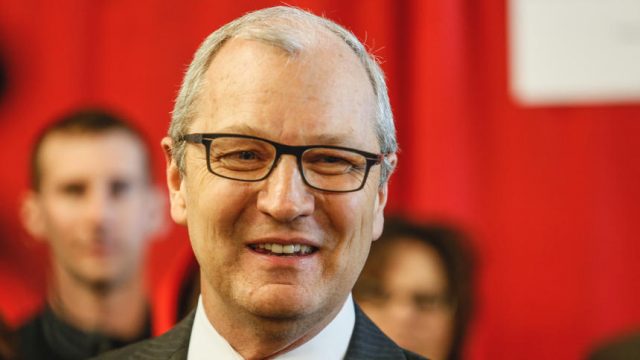Audio: “This Will Ultimately Enhance Your Privacy” Congressman Cramer Says of Controversial Internet Bill

North Dakota Representative Kevin Cramer speaks Sunday, April 3, 2016, at the ND GOP Convention at Scheels Arena in Fargo of his choice to endorse Donald Trump for president. Rick Abbott / The Forum
By now you’ve all probably heard of the controversy over internet privacy legislation passed by Congress recently and sent to President Donald Trump for signature (he has indicated that he’d sign it). The claim from critics of the bill is that it would allow your internet service provider to sell data about your use of the internet. For instance, which websites you visit, etc.
Which is pretty alarming claim. Today during our weekly open phones segment I asked Rep. Kevin Cramer about the legislation.
“This will ultimately enhance your privacy,” he told me of the legislation.
[mks_pullquote align=”right” width=”300″ size=”24″ bg_color=”#ffffff” txt_color=”#000000″]Under Obama, the FCC “made the internet a Title II jurisdictional utility,” Cramer said. “Title II was created for railroads,” he added.[/mks_pullquote]
He said the bill would “reverse one of Obama’s midnight rules imposed on internet service providers” by the Federal Communications Commission.
According to Cramer, prior to the FCC enacting its rules under the Obama administration this issue was handled by the Federal Trade Commission. He sees this legislation as sending the issue back to the FTC where he believes it rightly belongs.
Under Obama, the FCC “made the internet a Title II jurisdictional utility,” Cramer said. “Title II was created for railroads,” he added.
He said that the bill passed by Congress would allow a “harmonizing” between FCC and FTC rules.
“Privacy is much better protected under that regime,” he said, adding that encryption deployed by many internet users is making far less data available to ISP’s today.
He also pointed out that web services already collect far more data from users than ISP’s have access to. Which is true, and while critics of the legislation argue that those sort of services are optional while ISP’s aren’t, can anyone really say Google and Facebook are really all that optional optional to the modern internet user?
Anyway, here’s audio of our interview:
[fcc_jw_podcast key=”wxpIkVeb” player-image=”139345″]




